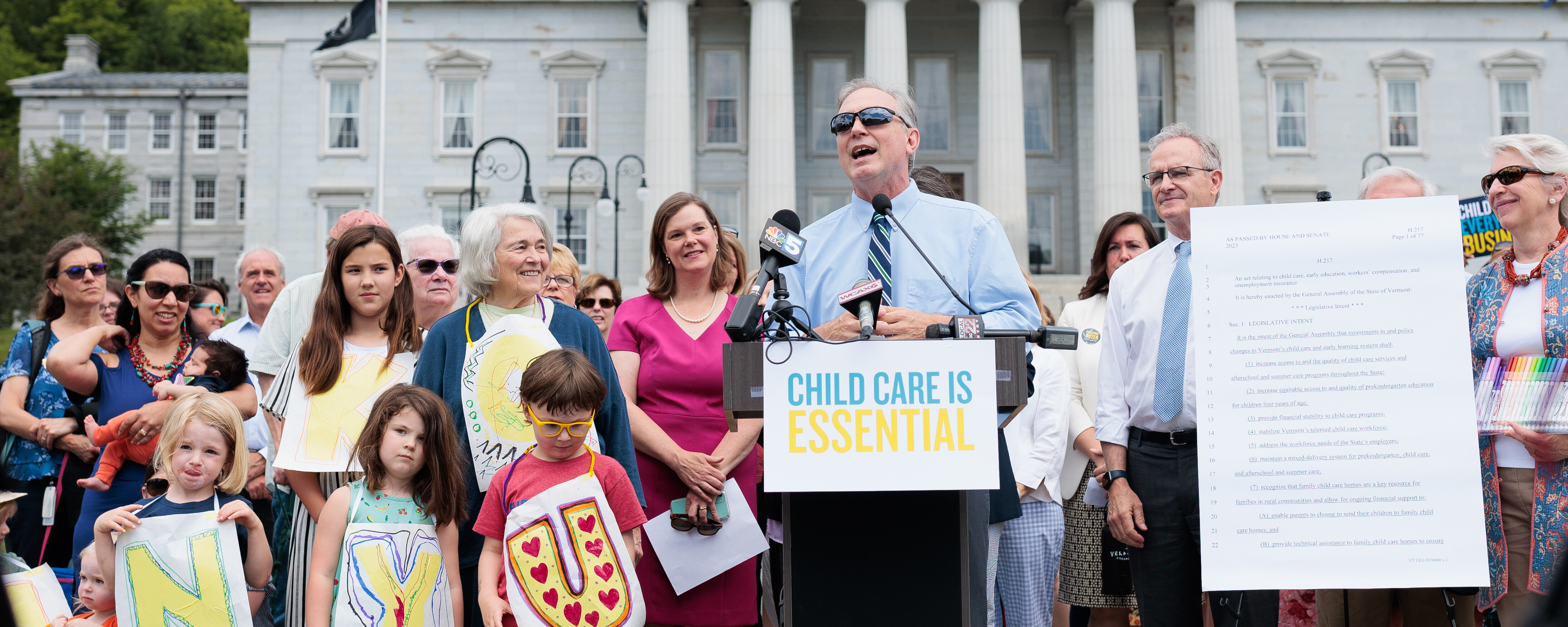
Learn about Act 76
Vermont's 2023 Child Care Bill (Act 76) will stabilize our child care sector and our workforce, shape future generations, and create a more affordable Vermont. Here's what that looks like for Vermonters.
The 2023 Child Care Bill Passed into Law. Now What?
In June, the Vermont Legislature made history by passing the 2023 Child Care Bill (Act 76) into law with overwhelming support from across the political spectrum! This comprehensive child care bill is not only a first-of-its-kind for Vermont and the nation, but it also changes the trajectory of our state by making Vermont’s communities more affordable.
CHECK OUT THIS ONE-PAGER ABOUT THE BILL
- Learn how this affects families.
- Learn how this affects businesses.
- Learn how this affects early childhood educators.
- Learn how this affects child care programs.
Why Does Vermont Need a Child Care Solution?
Quality child care is essential to the healthy development of young children, and it enables our state to thrive through a stable workforce. But right now, the child care crisis is hurting Vermont’s families and its economy.
In Vermont, three out of five of Vermont’s youngest children don’t have access to quality child care. Approximately 8,700 child care slots are still needed to meet the current demand. Meanwhile, families who have been lucky enough to find child care are spending up to 30% of their household income on it; this expense forces many parents, usually mothers, to leave the workforce to take care of their young children. Within the child care sector, early childhood educators are often underpaid, making a median annual wage of $39,315 and usually without benefits.
Long-term, sustainable public investment into Vermont’s child care system will support this essential industry, put hundreds of parents back into the workforce, and create millions of dollars in economic impact.
How Does the 2023 Child Care Bill Strengthen Vermont?
The 2023 Child Care Bill includes long-term, sustainable public investment that is fiscally responsible. Starting next year, the bill invests $125 million annually into the child care sector. It will stabilize our workforce and economy, shape future generations, and create a more affordable Vermont. Below are the highlights, but keep reading to learn how the child care bill impacts you specifically:
- About 7,450 more families will have access to child care financial assistance!
- Increased state funding will bolster child care programs’ capacity, which will increase access to child care across the state.
- Sustainable funding will support compensation, benefits, and professional development for Vermont’s early childhood educators, improving the overall quality and capacity of programs.
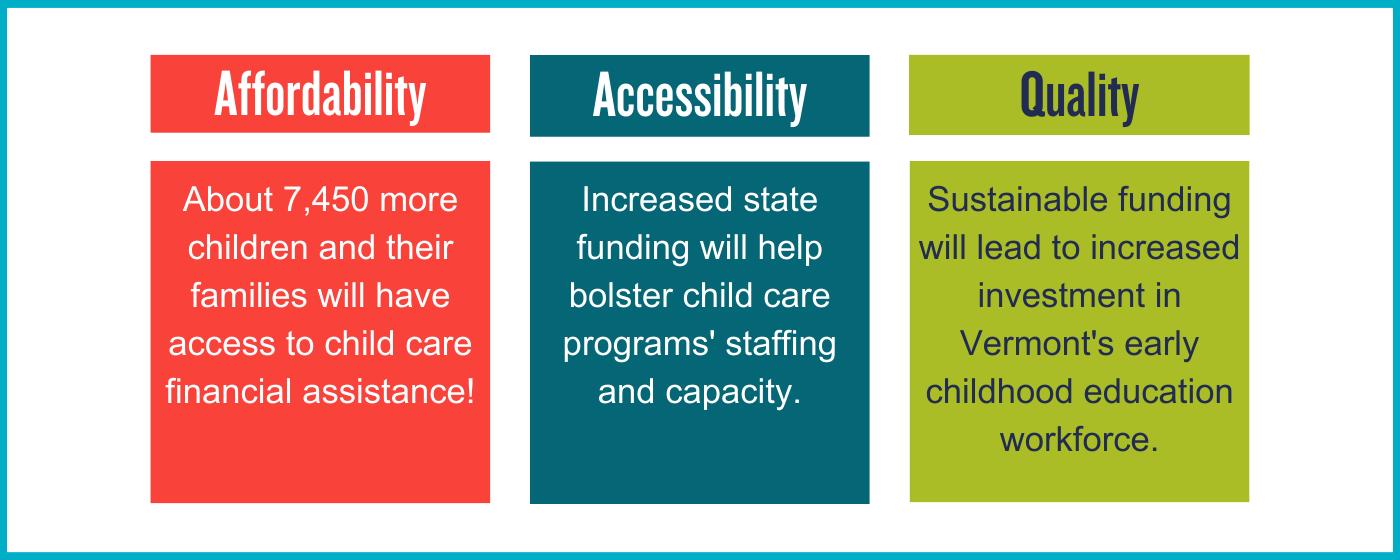
How Will the 2023 Child Care Bill Impact Vermonters?
For Families:
More affordable child care. The 2023 Child Care Bill expands the financial eligibility requirement for Vermont’s child care financial assistance program (known as CCFAP). Beginning in April 2024, more families will qualify for state aid to pay for child care; in October 2024, the eligibility criteria expands again. By the end of 2024, families earning up to 575% of the federal poverty level will be eligible. This expansion will help more than 7,000 Vermont families! Additionally, more families will qualify for 100% financial assistance.
LEARN MORE ABOUT CHILD CARE TUITION ASSISTANCE
Learn how to apply for child care tuition assistance.
Improved quality and access. Parents should also be aware that as state funds flow directly to child care programs statewide, both center- and home-based programs will be able to make facility updates, better compensate staff, and improve the quality of programs. This new funding will also boost capacity, increasing the number of child care slots available to families.
Better support for children with special needs. The 2023 Child Care Bill also addresses gaps in support for children with special needs. It directs the state to improve the funding process for accommodations — such as providing a one-on-one aide or specific equipment — for children with special needs who are enrolled in child care programs.
START YOUR SEARCH FOR CHILD CARE NOW
Where does the money for these public investments come from? In the first fiscal year of the bill’s implementation, funding will come from the state’s general fund and one-time funding sources. In future years, the state will implement a new payroll tax, which will fund child care investments alongside the continued general fund monies. The payroll tax will be 0.44%, with 0.33% paid by the employer and 0.11% paid by the employee. Self-employed individuals will pay only the employee share of 0.11%.
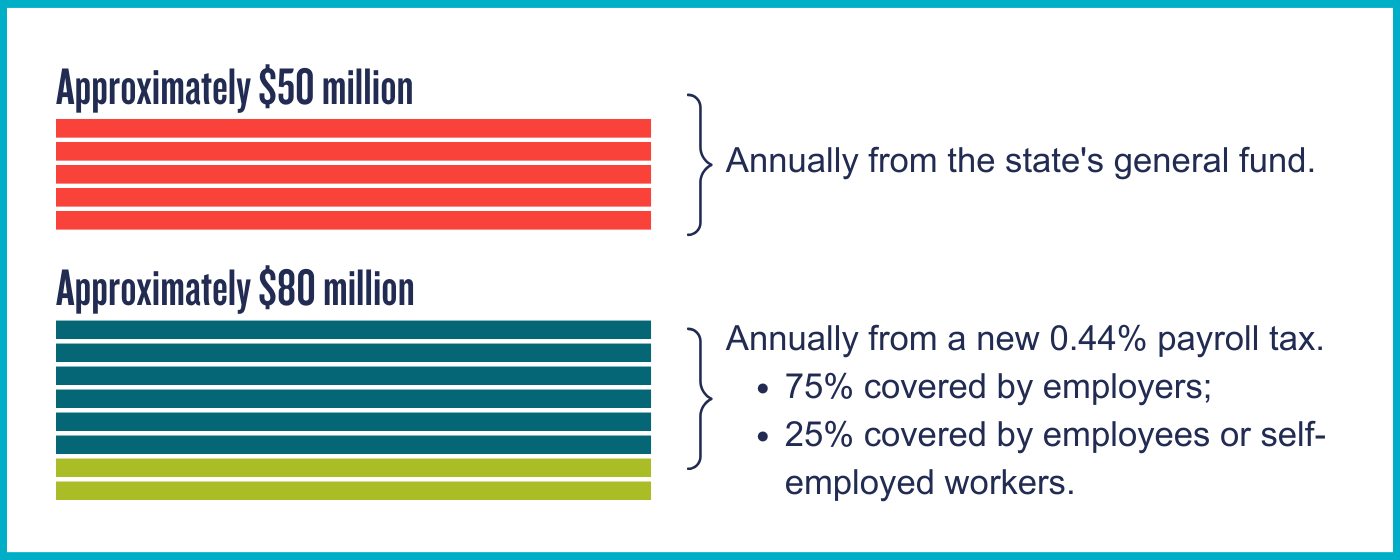
For Employers and Business Owners:
The 2023 Child Care Bill addresses the lack of child care statewide. This impacts business owners across the state who have seen parents leave the workforce or struggle to meet scheduling demands, and have struggled to recruit new staff. No one employer can solve this issue on their own. The investments in the bill will support stability for child care programs, affordability for families, and create more child care slots around the state, providing much-needed relief for families AND employers.
What is the payroll tax and how will it affect my business? As shared above, starting in July 2024, new child care investments from this bill will be partly funded through a new payroll tax. The tax will be 0.44% , with 0.33% paid by the employer and 0.11% paid by the employee. Self-employed individuals will pay only the employee share.
A more stable workforce. With sustainable public investment in the child care sector, thousands more Vermont families will be able to access affordable, quality child care, resulting in thousands of additional working adults being available to (re)enter the workforce. And, with Vermont leading the way on child care, the Green Mountain State will become a more desirable place to live and work for young families!
For Early Childhood Educators:
This bill invests in and values Early Childhood Educators (ECEs) in a way that this state has never done before, and it means ECEs will start to receive the compensation they deserve. Annual investments of $125 million will be injected into Vermont’s child care system through CCFAP to help programs recruit and retain staff, provide enhanced professional training and resources for ECEs, and expand capacity. Here’s what you need to know:
Major investments begin this summer and will ramp up in January 2024. Reimbursement rates will increase for both center- and home-based programs, regardless of STARS ratings. This will support more capacity, increase compensation, facility updates, and staffing investments.
Professional compensation for ECEs. The 2023 Child Care Bill sets the stage for minimum pay standards for ECEs, moving toward a future in which no ECE will earn less than a set amount. Those pay rates will align with recommendations from the Vermont Association for the Education of Young Children’s Advancing ECE as a Profession work.
Elevating Child Care and Early Education. The bill puts Building Bright Futures, the state’s early childhood public-private partnership, in charge of working with stakeholders to help the state successfully implement and evaluate the bill’s effectiveness.
For Child Care Programs:
Increased investments in CCFAP will help programs recruit and retain staff, expand capacity, offer non-traditional hours of care, and expand access to culturally competent and multilingual programming. Here’s what you need to know:
“Readiness Payments” begin this summer. The bill allocates $20 million in funding that will help programs prepare for the expansion of Vermont’s child care system. Stay tuned for more info from the Child Development Division.
Reimbursement rate increases for many programs. Beginning on July 2, many programs will benefit from an increase in reimbursement rates (the funds paid directly to a child care program on behalf of an eligible family). The new reimbursement rates will be equal to what programs with a 5-STARS designation currently receive from the state. STARS is the state’s quality recognition system, and this change ensures increased equity across the state.
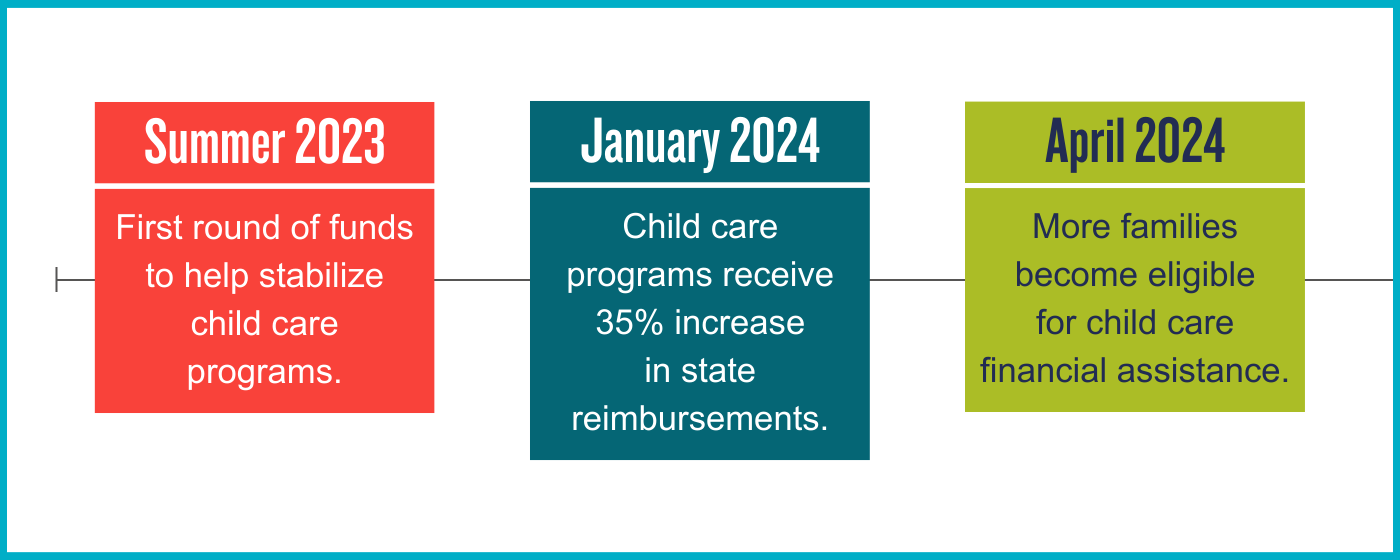
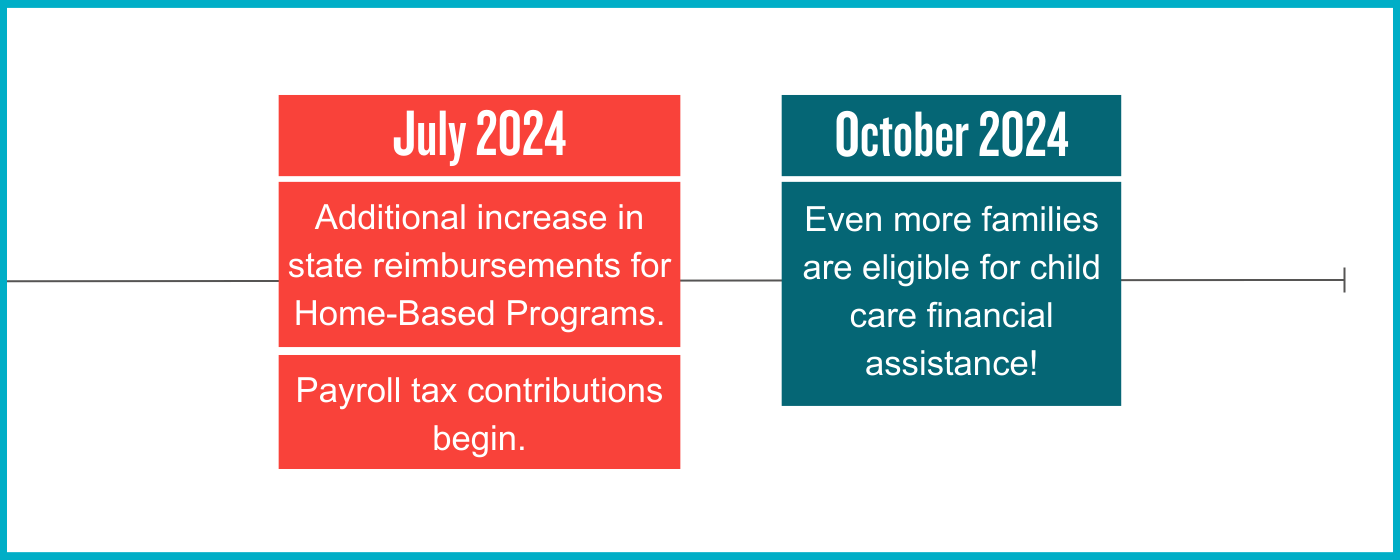
Reimbursement rates increase again in 2024. In January 2024, state reimbursement rates will increase again by 35%. In July 2024, family child care homes (FCCHs) will receive an additional rate increase equal to 50% of the difference between FCCH and center-based program rates. Additionally, these reimbursements will shift from being based on child attendance to child enrollment. This shift will provide stability and predictability to programs.
WHAT TO KNOW ABOUT CCFAP AS A CHILD CARE PROVIDER
Professional compensation for Early Childhood Educators (ECEs). The 2023 Child Care Bill sets the stage for the state to adopt minimum pay standards for ECEs in the near future to ensure that all ECEs are paid equitably. The bill directs the state to review minimum compensation recommendations from the Vermont Association for the Education of Young Children’s Advancing ECE as a Profession work.
Elevating Child Care and Early Education. The bill puts Building Bright Futures, the state’s early childhood public-private partnership, in charge of working with stakeholders to help the state successfully implement and evaluate the bill’s effectiveness.
There are no changes to Universal Pre-K at this time. The mixed delivery system remains in place. The bill creates a committee to explore how to expand Vermont’s Universal Pre-K system from 10-hours per week for all three- and four-year olds to a full-day program for four-year olds. A study committee will report back to the state legislature by December 1, 2024.
Child Care Resources
Let’s Grow Kids will be there every step of the way to help the state and our partner organizations successfully implement the 2023 Child Care Bill. Below are the key stakeholders who will be leading this implementation work:
- Vermont’s Child Development Division works with partners statewide to provide Vermonters affordable access to quality child care and child development services.
- First Children’s Finance helps child care entrepreneurs start and grow sustainable child care businesses. Connect with the Vermont chapter.
- Building Bright Futures advises the Governor and State Legislature on the wellbeing of children and their families by using evidence to inform policy.
- Vermont Association for the Education of Young Children (VTAEYC) advances equity and excellence in early childhood education, working specifically to provide resources and advocate for policies that support early childhood educators.